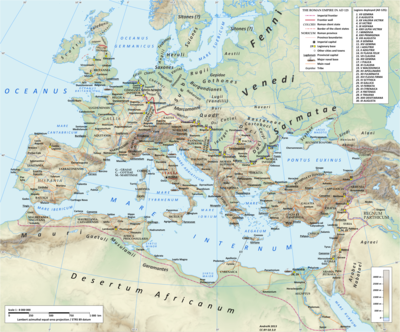Our website is made possible by displaying online advertisements to our visitors.
Please consider supporting us by disabling your ad blocker.
Marcomanni

The Marcomanni were a Germanic people who lived close to the border of the Roman empire, north of the River Danube. They were one of the most important members of the powerful cluster of related Suebian peoples in this region, which also included the Hermunduri, Varisti, and Quadi along the Danube, and the Semnones and Langobardi to their north, and they were particularly important to the Romans. They appear in Roman records from approximately 60 BC until about 400 AD.
After a major defeat to the Romans in about 9 BC, the Marcomanni somehow received a new king named Maroboduus, who had grown up in Rome. He subsequently led his people and several others into a region surrounded by forests and mountains in the present day Czech Republic. Before 9 BC the homeland of the Marcomanni is not known, but archaeological evidence suggests that they lived near the central Elbe river and Saale, or possibly to the southwest of this region in Franconia. The Marcomanni were first reported by Julius Caesar among the Germanic peoples who were attempting to settle in Gaul in 58 BC under the leadership of Ariovistus, but he did not explain where their homeland was.
From his base in Bohemia, Maroboduus built up a Rome-aligned Suebian empire, but the Langobardi and Semnones left when Maroboduus failed to support the rebellion of Arminius against Rome. The subsequent war among the Germanic peoples was damaging to both sides. This damaged Maroboduus's reputation, and he was eventually toppled from power, and died in exile in Ravenna. This suited the empire because despite their neutrality towards Rome, Roman rulers saw the Marcomanni as a potential threat to them, within striking distance of Italy. Over the centuries the Romans sought to control their leaders, and disrupt their relationships with neighbouring peoples. Despite long periods of peace and prosperity there were also several periods of intense warfare between them, often triggered by the actions of peoples living further from the Roman frontier.
In the second century AD, during the reign of Marcus Aurelius and his co-emperors, the Romans pursued a major series of bloody wars against the Marcomanni and their allies which are called the Marcomannic wars. At one point the Marcomanni and their allies invaded Italy itself. The Marcomanni were weakened, and many were moved into the Roman empire, but the tensions behind this war were never resolved, and their neighbours such as the Quadi continued to come into conflict with Rome. This ended only when Goths, Alans and Huns moved from the east into the Middle Danube region and took effective control of it in the late 4th century. The region subsequently came under the rule of Attila, who died in 453. By this time many Marcomanni apparently already lived within Pannonia in the Roman empire, and at least some of these had converted to Christianity. There are indications that a significant number apparently came to live to the south between the Sava and Drava rivers in what is now Slovenia and Croatia. More generally, although the details are now unclear, many Marcomanni and other Suebian communities from the region of the Elbe and Danube are believed to have joined the Langobardi who moved southwards into the Middle Danube region, replacing the short-lived kingdoms which arose after Attila's death, and subsequently moved into Italy under pressure from the arrival of the Avars from the east. Other Marcomanni are likely to have joined the Alemanni, and Bavarians to their west, or even to have left the region entirely with the Suebi who founded the Kingdom of the Suebi in what is now Portugal and Spain.
Previous Page Next Page


